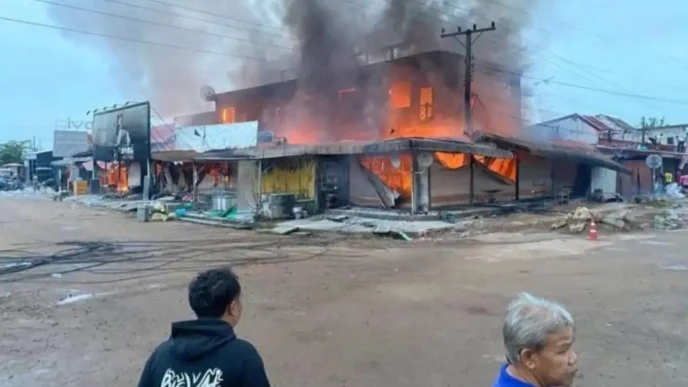In a chilling tale of deception and survival, Gan Jiea Jie, a 19-year-old Malaysian from Johor Baru, has emerged from an 11-month nightmare of forced labour and abuse at the hands of a human trafficking syndicate. Lured by the promise of a lucrative job transporting gold between Thailand and Malaysia, Gan instead found himself smuggled across borders, beaten, and coerced into working 18-hour days in scam centres in Myanmar. His story, shared in an exclusive interview with The Star, exposes the dark underbelly of transnational crime in South East Asia, where vulnerable young people are preyed upon with false promises of wealth.
Gan’s escape, facilitated by a friend and the Malaysian Embassy in Thailand, marks a rare victory against the sophisticated networks that exploit thousands across the region. Now under the protection of Thai authorities and undergoing screening through Thailand’s National Referral Mechanism (NRM)—a system designed to identify and support trafficking victims—Gan’s ordeal raises urgent questions about the scale of human trafficking in South East Asia and the challenges of combating it.
A Dream Turned Nightmare
Gan’s story began with an offer too good to be true: RM80,000 for a one-week job transporting gold from Thailand to Malaysia. At 18, coming from a broken family and burdened by debt, the social media seemed like a lifeline. Without informing his family, he packed a small bag and left Johor Baru, enticed by images of plane tickets and hotel bookings sent by a supposed “company representative.” A cash advance deposited into his account further convinced him of the opportunity’s legitimacy.
“I have never even been to an airport, let alone travelled,” Gan told The Star on 16 February 2025, shortly after his escape. “I was nervous as I did not have any money, but the ‘representative’ gave me a cash advance.”
However, the illusion of a golden opportunity shattered upon arrival at Bangkok’s airport in March 2024. Instead of a quick transfer to a hotel, Gan endured a long journey through remote areas, passing multiple police checkpoints. His destination was not a luxury hotel but a secluded spot in a forested area with no mobile signal. From there, he was ferried across a river on a raft, greeted by armed men in uniforms, and taken to what he described as a soldiers’ camp. It was then that the true nature of his predicament became clear.
A man, believed to be a Taiwanese national, informed Gan that he would need to work for a year before being allowed to leave—or pay a staggering US$50,000 (RM220,000) for his freedom. “At that moment, I realised I had fallen victim to a scam,” Gan recalled.
Forced Labour in a Scam Empire
Gan was thrust into a highly organised criminal operation in Myanmar, part of a sprawling complex that he described as a “small town” with shops, amenities, and hundreds of workers from various nationalities, predominantly Chinese. Guarded by armed men, the complex operated like a corporation, complete with a chief executive officer, managers, supervisors, and staff. Workers were stripped of their identities, given nicknames—Gan’s was “Archie”—and assigned identification tags.
The work was gruelling and dehumanising. Tasked with running love and investment scams on social media, Gan used multiple mobile phones to target victims in countries including Japan, Korea, the United States, the United Kingdom, and Malaysia. Failure to meet quotas resulted in brutal punishment. “I worked 18 hours a day. If I did not achieve my targets, I was beaten up. There was even a time I was zapped with a taser,” he said.
Over 11 months, Gan was “sold” between different bosses and moved to three separate companies within the network. Those who performed well were rewarded with restaurant dinners and cash bonuses, while underperformers like Gan subsisted on basic meals in the canteen. Escape seemed impossible, with bounties of up to US$10,000 (RM44,000) placed on runaways. Gan himself became a target of such a bounty after his eventual escape.
A Daring Escape
Gan’s chance for freedom came unexpectedly in February 2025, when the syndicate planned to relocate operations to Cambodia. On 16 February, accompanied by a manager nicknamed Vicky or Robert and another individual, Gan crossed a shallow river back into Thailand. After a two-day journey to a hotel in Bangkok, avoiding roadblocks due to the manager’s stash of mobile phones used in the scams, Gan seized a fleeting opportunity. Pretending to step out for food on 18 February, he contacted a friend, Joyce Hwang Qi Hui, who urged him to seek help from the Malaysian Embassy.
With just 400 baht (RM52) in his pocket, Gan could not reach the embassy but managed to afford a Grab ride to a nearby police station. Now in the care of Thai authorities, he is assisting with investigations and undergoing screening under the NRM, a multi-agency framework involving law enforcement, NGOs, and social services to support trafficking victims.
The Broader Crisis
Gan’s story is not an isolated incident. He claims to have met many other Malaysians trapped in similar circumstances, lured by promises of high-paying jobs only to be trafficked and exploited. The South East Asian region, with its porous borders and economic disparities, has long been a hotspot for human trafficking. Criminal syndicates exploit vulnerable individuals, often from poorer communities, with false job offers, only to subject them to forced labour, debt bondage, or worse.
Thailand, a transit and destination country for trafficking, has made efforts to combat the issue through mechanisms like the NRM. However, challenges remain, including corruption, inadequate resources, and the difficulty of dismantling transnational networks that operate across multiple jurisdictions. Myanmar, where Gan was held, has become a notorious hub for scam centres, particularly in border regions like Shan State, where weak governance and conflict create fertile ground for organised crime.
For Malaysia, Gan’s case highlights the vulnerability of its youth to such scams. Social media, while a tool for connectivity, has also become a hunting ground for traffickers who prey on desperation and inexperience. Gan’s lack of travel experience and financial struggles made him an easy target, a pattern likely replicated across countless others.
A Call for Change
Now awaiting repatriation to Malaysia, Gan expressed a simple desire: to return home and eat local food. Reflecting on his year of torment, he admitted to being forced into “bad things” but vowed to turn his life around. “My escape is a miracle, and I promise to change and lead a better life after this,” he said. His message to other young people is stark: never trust job offers abroad that seem too good to be true.
Gan’s ordeal underscores the urgent need for greater awareness, stronger regional cooperation, and robust protections for vulnerable populations. Governments, NGOs, and tech platforms must work together to disrupt trafficking networks, educate potential victims, and provide safe pathways for those seeking better opportunities. For every story of escape like Gan’s, countless others remain trapped in silence, waiting for a miracle of their own.














